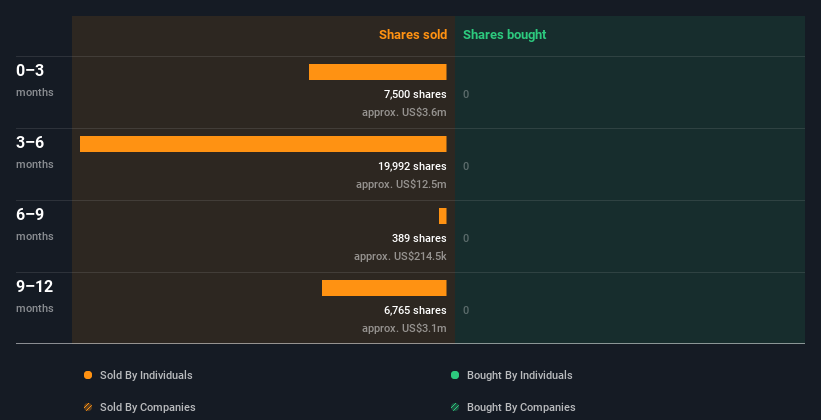- United States
- /
- Software
- /
- NasdaqGS:INTU
Intuit Inc.'s (NASDAQ:INTU)) market cap declines to US$125b but insiders who sold US$19m stock were able to hedge their losses
Insiders seem to have made the most of their holdings by selling US$19m worth of Intuit Inc. (NASDAQ:INTU) stock at an average sell price of US$552 during the past year. The company’s market cap plunged by US$6.2b after price dropped by 4.7% last week but insiders were able to limit their loss to an extent.
While insider transactions are not the most important thing when it comes to long-term investing, we would consider it foolish to ignore insider transactions altogether.
See our latest analysis for Intuit
Intuit Insider Transactions Over The Last Year
The insider, Laura Fennell, made the biggest insider sale in the last 12 months. That single transaction was for US$9.1m worth of shares at a price of US$611 each. While we don't usually like to see insider selling, it's more concerning if the sales take place at a lower price. The good news is that this large sale was at well above current price of US$443. So it is hard to draw any strong conclusion from it.
Intuit insiders didn't buy any shares over the last year. You can see the insider transactions (by companies and individuals) over the last year depicted in the chart below. If you want to know exactly who sold, for how much, and when, simply click on the graph below!

If you are like me, then you will not want to miss this free list of growing companies that insiders are buying.
Intuit Insiders Are Selling The Stock
Over the last three months, we've seen significant insider selling at Intuit. In total, insider Laura Fennell dumped US$3.6m worth of shares in that time, and we didn't record any purchases whatsoever. This may suggest that some insiders think that the shares are not cheap.
Does Intuit Boast High Insider Ownership?
Another way to test the alignment between the leaders of a company and other shareholders is to look at how many shares they own. I reckon it's a good sign if insiders own a significant number of shares in the company. Intuit insiders own 2.7% of the company, currently worth about US$3.4b based on the recent share price. I like to see this level of insider ownership, because it increases the chances that management are thinking about the best interests of shareholders.
So What Do The Intuit Insider Transactions Indicate?
An insider sold Intuit shares recently, but they didn't buy any. And there weren't any purchases to give us comfort, over the last year. But it is good to see that Intuit is growing earnings. It is good to see high insider ownership, but the insider selling leaves us cautious. In addition to knowing about insider transactions going on, it's beneficial to identify the risks facing Intuit. While conducting our analysis, we found that Intuit has 3 warning signs and it would be unwise to ignore them.
Of course, you might find a fantastic investment by looking elsewhere. So take a peek at this free list of interesting companies.
For the purposes of this article, insiders are those individuals who report their transactions to the relevant regulatory body. We currently account for open market transactions and private dispositions, but not derivative transactions.
The New Payments ETF Is Live on NASDAQ:
Money is moving to real-time rails, and a newly listed ETF now gives investors direct exposure. Fast settlement. Institutional custody. Simple access.
Explore how this launch could reshape portfolios
Sponsored ContentNew: AI Stock Screener & Alerts
Our new AI Stock Screener scans the market every day to uncover opportunities.
• Dividend Powerhouses (3%+ Yield)
• Undervalued Small Caps with Insider Buying
• High growth Tech and AI Companies
Or build your own from over 50 metrics.
Have feedback on this article? Concerned about the content? Get in touch with us directly. Alternatively, email editorial-team (at) simplywallst.com.
This article by Simply Wall St is general in nature. We provide commentary based on historical data and analyst forecasts only using an unbiased methodology and our articles are not intended to be financial advice. It does not constitute a recommendation to buy or sell any stock, and does not take account of your objectives, or your financial situation. We aim to bring you long-term focused analysis driven by fundamental data. Note that our analysis may not factor in the latest price-sensitive company announcements or qualitative material. Simply Wall St has no position in any stocks mentioned.
About NasdaqGS:INTU
Intuit
Provides financial management, payments and capital, compliance, and marketing products and services in the United States.
Outstanding track record with flawless balance sheet.
Similar Companies
Market Insights
Weekly Picks

Early mover in a fast growing industry. Likely to experience share price volatility as they scale


A case for CA$31.80 (undiluted), aka 8,616% upside from CA$0.37 (an 86 bagger!).


Moderation and Stabilisation: HOLD: Fair Price based on a 4-year Cycle is $12.08
Recently Updated Narratives

Airbnb Stock: Platform Growth in a World of Saturation and Scrutiny

Adobe Stock: AI-Fueled ARR Growth Pushes Guidance Higher, But Cost Pressures Loom

Thomson Reuters Stock: When Legal Intelligence Becomes Mission-Critical Infrastructure
Popular Narratives


Crazy Undervalued 42 Baggers Silver Play (Active & Running Mine)


NVDA: Expanding AI Demand Will Drive Major Data Center Investments Through 2026


The AI Infrastructure Giant Grows Into Its Valuation
Trending Discussion


